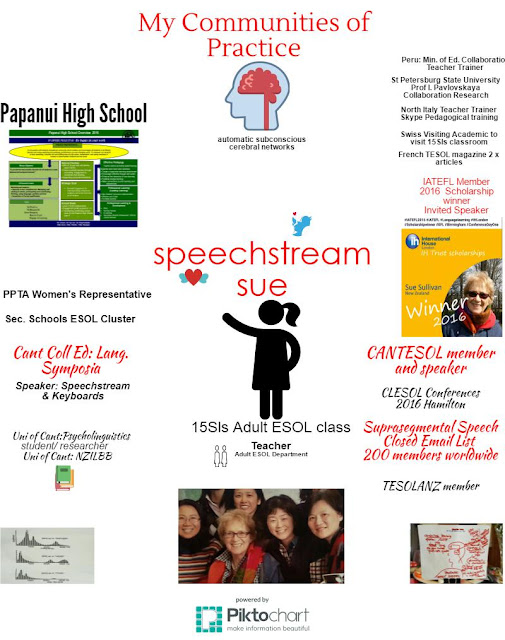- What is my practice?
- What is my professional context?
- Who are my community of practice ?
(or - in work find your happiness!)
Our school is also part of a cluster, the Papanui Learning Community Cluster. This includes three primary, one intermediate, one secondary and two integrated state schools, plus 9 early childhood providers. Of my own 20 adult students aged 25 to 70 years, several have children or even grandchildren at these schools and this makes a meaningful circle of empathy in the local community.
PHS has a very strong community – within its own staff and their subgroups, within the community at large and within the various cultural dimensions our 15% Maori, 11% Asian and 68% European students provide. If the Wenger et al’s (2002) definition of success for an organisation is “their ability to design themselves as social learning systems and also to participate in broader learning systems” then Papanui done a good job of this for me.
As an ESOL teacher I am an active member of CANTESOL – Canterbury Teachers of English to Speakers of Other Languages – and will giving my third talk to them in July. The focus of these teachers is on ways of teaching and getting the best for their students. The focus of another community I participate in – Secondary schools cluster for ESOL teachers - is using and adapting NCEA units. A complete different community is my relationship with Canterbury University Language Symposium, where I and a broader range of academic practitioners give papers at two symposia a year.
An even deeper theoretical community is the New Zealand Institute of Language, Brain and Behaviour (NZILBB) at the university of Canterbury which is drawing academics in the language fields from all over the world to its active and intensive research activities in linguistics. In this community I am more of a sightseer as I chose talks that fringe onto my own adult second language acquisition research.
And the community with whom I share my passion for brain networks and adult oral language acquisition is an email list of some 200 professors and lecturers spread across the world. Again this CoP is a domain where detailed research (and jokes and sorrows) are shared and commented on and out of which have come new journals, new understandings and much encouragement. It is a community, it has a practice and shared domain of interest – yet most of us have never met. And it has no mission statement, no charter, no particular goals.
If in Etienne Wenger’s imagery the higher visited hilltops area are our more passionate interactions, this email list, our local and national TESOLANZ and my iatefl groups are my high points of community. And to bring more sharing to my own department’s interactions I have decided to reflect with the RISE inquiry tool.
When I begin to reflect on all these communities I think what about x? and what about y? In my mindlab community I have discovered insights and angles I would have otherwise missed. And now I want to say: My old psychology professor, now retired, and now a friend, is he not a ‘community of practice’ with me? Because he is the one physical person in Christchurch to whom I frequently go and chew over my latest ideas about implicit cerebral procedures and adult learning. Out of our conversations I re-evaluate my progress and even my lessons. So can a two-person chat be a community of practice? I think so.
References
Finlay,
L. (2009) Reflecting on reflective practice. PBPL. Retrieved from http://www.open.ac.uk/opencetl/files/opencetl/file/ecms/web-content/Finlay-%282008%29-Reflecting-on-reflective-practice-PBPL-paper-52.pdf
Etienne
Wenger talks about 'walking the landscape of practice' recommended
viewing. https://app.themindlab.com/media/9244/view
Wenger, E., McDermott, R., & Snyder,
W. (2002). Cultivating Communities of Practice: A
Guide to Managing Knowledge. Cambridge, MA: Harvard Business School
Press.
Wray, E. The RISE model for self evaluation. Retrieved from http://www.risemodel.com



No comments:
Post a Comment